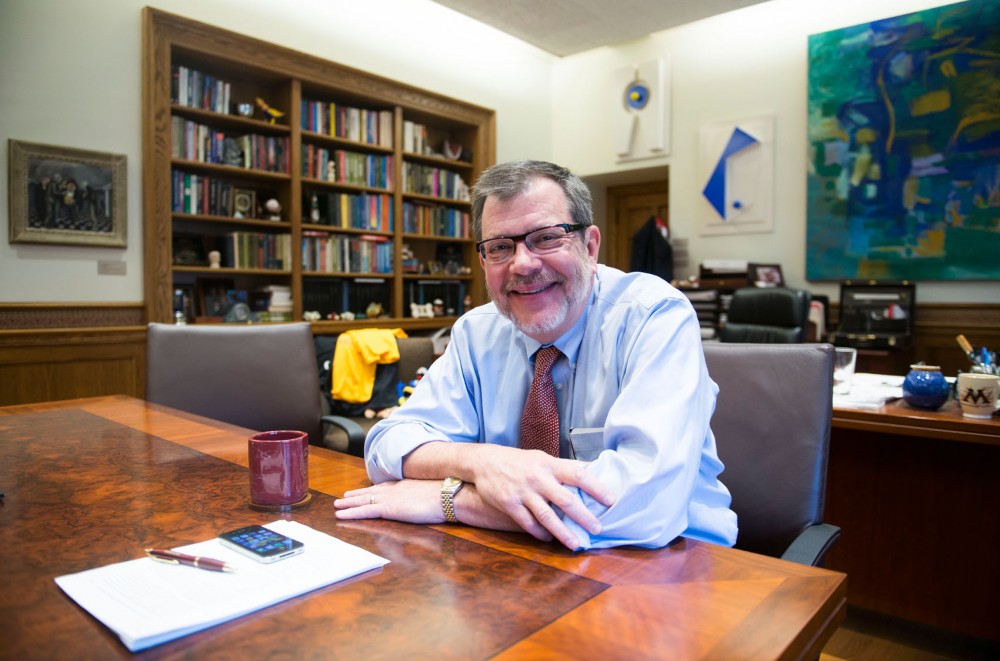The Minnesota Daily sat down with University of Minnesota President Eric Kaler on Wednesday for its monthly Kickin’ It with Kaler interview.
Kaler talked about the retirement of Dean Robert Elde, the reports from University-hired consulting firms that look into the school’s spending, and “gopheralls.”
At last week’s Board of Regents meeting you announced a plan to cut administrative costs by $90 million over the next six years. This announcement follows a year of the University being criticized for excessive administrative spending. Thoughts?
While we certainly have been criticized for administrative spending, the reports that we’ve gotten back from Sibson and Huron show, in fact, that the University is well within the norms for administrative overhead. … I interpret that as saying, “Well, we’re pretty good, but we can obviously get better.” And we’re going to get better.
We’ve been working hard for two years to set the stage for these next steps, and we’ve already identified well over
$30 million in savings, as detailed last week at the board meeting. So I would say that having done that preliminary work, we’re now ready to commit to a longer-term goal, and we believe we have the tools in hand to.
Last session, state legislators requested for more transparency in the University’s budget. Richard Pfutzenreuter mentioned this at last week’s meeting. Are there any new strategies the University will utilize in terms of securing state funds?
I think it’s very fair for the state leaders, the government and the legislators to expect the University to be accountable and expect the University to be effective and efficient, and I think these reductions in administrative costs we’ve been talking about and these reports go along right toward ensuring a good level of comfort in those legislators with how the University is operating.
Are there some areas or departments at the University that will see more cuts than others?
It’s too early to fully identify where all reductions are going to be, but we’re going to look across the University. My goal is to leave nothing unexplored that can have the question asked and answered, “Can it be done more effectively?”
Will students be affected by this plan to save costs? Will they see any visible changes on campus?
We’re going to move those dollars away from the administrator expenses into the delivery to teaching, research and outreach, and so I would expect that students would see benefits in the classroom. … Hopefully we’ll be able to reduce the net cost of coming to the University, so increasing scholarship opportunities. … That’s why we’re doing this; we’re not doing it for fun.
Anything specifically in the classroom a student can expect to see?
I think you’ll be able to see us refresh technology in the classrooms more quickly and on a shorter cycle. We’ll be able to hopefully invest some of these dollars in classroom renovations. … We hope to be able to translate resources into hiring faculty, so you should see increased class availability and ultimately smaller classes.
CBS Dean Robert Elde announced he will retire next summer. How will the University adjust to his absence?
We will miss Bob very much. … As you know, it leads to some conversations about the potential merger of CBS and CFANS. That potential merger is something that needs to be considered from all angles. To me, it has a couple of very attractive elements. But we intend to talk broadly in the community, both inside and outside the University — who will be affected by this potential merger.
Do you expect any opposition from faculty or staff in terms of the merger?
I don’t know that I would characterize it as expecting opposition. I am certain there will be a full spectrum of opinions about this. There usually is at almost any new idea to the University, so we’ll sort out the pros and cons.
How will the University benefit?
To me, it’s really a very nice vertical integration. From the fundamental cell biology that is critical to agriculture … to the delivery of advice to the farmers … and specialists in agriculture. So I think having all of those elements of admission under one umbrella will make a more effective and efficient process.
Next week is the University’s homecoming. How will you be showing your Golden Gopher spirit?
I have a pair of maroon pants that are very stylish, and people seem to enjoy seeing me wearing them, so I will be in those. I’m looking forward to the homecoming parade — Karen and I usually ride in that. … It’s a great opportunity for Gopher pride, and I enjoy being part of that.
Do you have the overalls and everything?
I do not have gopheralls. I would like to have a pair, to tell you the truth, but people around me, including my wife, think that a 57-year-old man might not wear gopheralls.
What are you looking forward to the most this academic year?
We’re in the final stages of interviewing for the dean of the Medical School and vice president for health sciences. … We have a new leader at Fairview, our partner in health care delivery, and I am looking forward to developing a good working relationship with him. We have always-interesting opportunities in philanthropy. And of course, finally, we have our capital request to the state Legislature who convenes in February.
Anything else?
I should note there’s been a lot of press about Jerry Kill lately. I’m very much a Jerry Kill fan. I think he’s a terrific leader of the football team, and I’m very proud to have him on our team.


